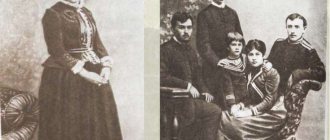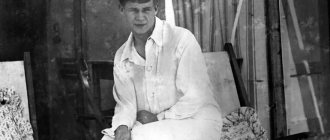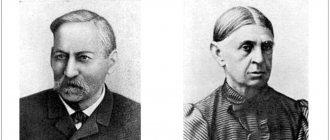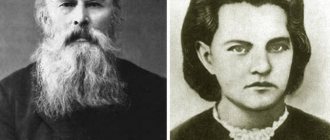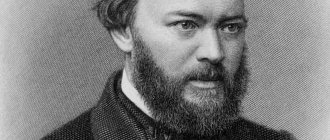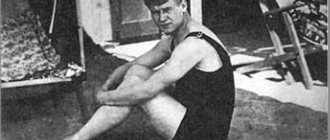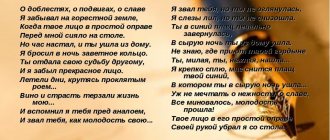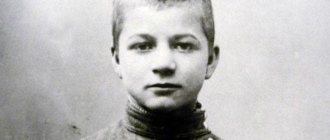Alexander Alexandrovich Blok, who lived only 41 years, gave the world the most beautiful works, idolized his Beautiful Lady until the end of his life, and is recognized as the leading representative of Russian symbolism. His literary start began even before birth: his father was a professor, his mother was a famous writer in her time. Blok's chronological table accurately reflects his life and work by date.
Chronological table
November 16, 1880 is the poet’s date of birth.
1889-1898 - study at the gymnasium.
1898-1906 - studied at St. Petersburg University. Slavic-Russian department of the Faculty of History and Philology.
1903 - Blok’s marriage to Lyubov Dmitrievna Mendeleeva.
1904 - the poet’s first book, entitled “Poems about a Beautiful Lady,” dedicated to his wife, is published.
1905-1908 - Alexander Blok realized his true commitment to the ideas of the revolution. All subsequent work of the poet was associated with the glorification of the bright beginnings of the Bolsheviks. The poet was recognized and highly appreciated by his compatriots.
1907-1911 - Blok’s travels in Italy, Germany, Europe. A series of wonderful works has been created. “Italian Poems” is the poet’s outstanding creation.
1916 - beginning of service in the army, in the engineering and construction squad.
1917 - work in the Extraordinary Commission of Inquiry. “The Last Days of Imperial Power” is a book written by Blok based on his experience.
1921 - Blok’s last public appearances before the people.
On August 7, 1921, the poet died of an unknown illness.
Chronological table of Blok (life and work)
A chronological table of Blok’s life, as well as his work, is presented in this article.
Chronological table of Alexander Blok
Alexander Alexandrovich Blok is a Russian poet, writer, publicist, playwright, translator, and literary critic. A classic of Russian literature of the 20th century, one of the largest representatives of Russian symbolism.
November 6 (28), 1880 - Born in St. Petersburg into the family of professor Alexander Lvovich Blok and writer Alexandra Andreevna.
1891—1898 — Study at Vvedenskaya gymnasium.
1898—1906 — Studying at the Faculty of Law of St. Petersburg University; then - on historical and philological.
1903 — First publications of the cycle of poems “From Dedications” in the magazines “New Path” and “Northern Flowers”. The wedding of Blok and L.D. Mendeleeva.
1904 — The cycle “Poems about a Beautiful Lady,” dedicated to L.D., is being published as a separate publication. Mendeleeva. 1905-1910 The poems “Stranger”, “Russia”, “On the Kulikovo Field”, “On the Railway” were written. The collections “Snow Mask”, “Earth in the Snow”, “Lyrical Dramas” were published.
1907 - collections of poems
"Unexpected Joy", "Snow Mask"
1908 - “Earth in the Snow”, collection “Lyrical Dramas”. Blok’s great drama “Song of Fate” has been written
1909 — a trip to Italy and Germany, the result of which was the cycle “Italian Poems”.
1911 — Blok traveled throughout Europe (Paris, Brittany, Belgium, Holland, Berlin). “Collected Poems” is published in three volumes.
- Blok's biography
1914 — Meeting the singer L.A. Delmas, to whom the poet dedicates the cycle “Carmen”.
1915 — The collection “Poems about Russia” and the poem “The Nightingale Garden” are published.
1916—1917 — During the First World War he was drafted into the army.
1917-1920 — Collaborates with the publishing house "World Literature" and with the Theater Department of the People's Commissariat for Education, giving speeches and reading poetry.
1918 — The poem “The Twelve”, the poem “Scythians” and the article “Intelligentsia and Revolution” were written.
1921 — Poem "To the Pushkin House". In Moscow and Petrograd he gives a speech “On the appointment of a poet”, dedicated to the memory of A.S. Pushkin.
August 7, 1921 - dies in Petrograd. He was buried at the Smolensk cemetery. In 1944, the poet’s ashes were transferred to the Literary Bridge of the Volkov Cemetery.
Brief chronological table of the Block
The presented chronological table of Blok includes key dates from the life of the great poet. The material is recommended for schoolchildren to prepare for Russian literature lessons, as well as for everyone who is interested in the fate of one of the most prominent writers of the “Silver Age”.
Alexander Alexandrovich Blok is a famous Russian symbolist poet who had a huge influence on Russian literature and culture of the twentieth century. His life and work continue to inspire modern writers, musicians and directors. A brief biography of Blok in the table will help you quickly become familiar with the key events in the life of the great poet and refresh your memory of previously acquired knowledge.
- Blok's short poems about love
1880, November 6 (28) – Born in St. Petersburg into the family of professor Alexander Lvovich Blok and writer Alexandra Andreevna.
1891-1898 – Study at Vvedenskaya gymnasium.
1898-1906 – Studying at the Faculty of Law of St. Petersburg University;
then - on historical and philological.
1903 – First publications of the cycle of poems “From Dedications” in the magazines “New Path” and “Northern Flowers”;
wedding of Blok and L.D. Mendeleeva.
1904 – The cycle “Poems about a Beautiful Lady”, dedicated to L.D., is being published as a separate publication. Mendeleeva.
1905-1910 – Poems “Stranger”, “Russia”, “On the Kulikovo Field”, “On the Railway” were written;
The collections “Snow Mask”, “Earth in the Snow”, “Lyrical Dramas” were published.
- Life and work of Alexander Blok
1907 – Collections of poems “Unexpected Joy”, “Snow Mask”.
1908 – “Earth in the Snow”, collection “Lyrical Dramas”;
Blok's great drama "Song of Fate" was written.
1909 – Travel through Italy and Germany, the result of which was the cycle “Italian Poems.”
1911 – Blok traveled around Europe (Paris, Brittany, Belgium, Holland, Berlin);
“Collected Poems” is published in three volumes.
1914 – Meeting the singer L.A. Delmas, to whom the poet dedicates the cycle “Carmen”.
1915 – The collection “Poems about Russia” and the poem “The Nightingale Garden” are published.
1916-1917 – During the First World War he was drafted into the army.
1917-1920 – Collaborates with the publishing house “World Literature” and with the Theater Department of the People's Commissariat for Education, gives speeches and reads poetry.
1918 – The poem “The Twelve”, the poem “Scythians” and the article “Intelligentsia and Revolution” were written.
1921 – Poem “To the Pushkin House”;
in Moscow and Petrograd gives a speech “On the appointment of a poet”, dedicated to the memory of A.S. Pushkin.
1921, August 7 - Dies in Petrograd. He was buried at the Smolensk cemetery.
1944 – The poet’s ashes were transferred to the Literary Bridge of the Volkov Cemetery.
The life and work of Alexander Alexandrovich Blok
| date | Event |
| November 16 (28), 1880 | Born in St. Petersburg, Russian Empire. |
| 1889 | Sent to Vvedenskaya gymnasium. |
| 1891 | Wrote two issues of the magazine “Ship”. |
| 1894 — 1897 | Together with his brothers he wrote the handwritten magazine “Vestnik”; a total of 37 issues of the magazine were published. |
| 1897 | In St. Petersburg, Alexander Blok enrolled in a theater club. However, after his first success, he was no longer given roles in the theater. |
| 1897 | Finding himself with his mother abroad, in the German resort town of Bad Nauheim, 16-year-old Blok experienced his first strong youthful love with 37-year-old Ksenia Sadovskaya. She left a deep mark on his work. |
| 1898 | |
| 1901 | Transferred to the Slavic-Russian department of the Faculty of History and Philology. |
| June 4, 1901 | While in the village of Shakhmatovo, he wrote his popular poem: “I have a presentiment of You. Years pass by..." |
| 1903 | He married Lyubov Mendeleeva, daughter of D.I. Mendeleev, the heroine of his first book of poems, “Poems about a Beautiful Lady.” It is known that Alexander Blok had strong feelings for his wife, but periodically maintained connections with various women: at one time it was the actress Natalya Nikolaevna Volokhova, then the opera singer Lyubov Aleksandrovna Andreeva-Delmas. Lyubov Dmitrievna also allowed herself hobbies. On this basis, Blok had a conflict with Andrei Bely, described in the play “Balaganchik”. Andrei Bely, who considered Mendeleeva the embodiment of a Beautiful Lady, was passionately in love with her, but she did not reciprocate his feelings. However, after the First World War, relations in the Blok family improved, and in recent years the poet was the faithful husband of Lyubov Dmitrievna. |
| November 24, 1903 | Wrote the famous poem Factory (“The windows in the neighboring house are yellow…”) |
| April 24, 1906 | He wrote the famous poem “Stranger” (“In the evenings above restaurants”), based on life experiences. Included in the poetic cycle "City". First published in the collection “Unexpected Joy” (Moscow, Scorpion Publishing House, 1907). |
| 1906 | Graduated from the Slavic-Russian department of the Faculty of History and Philology. |
| September 24, 1906 | Wrote the famous poem Rus (“You are extraordinary even in a dream...”) |
| 1908 | Wrote the famous poem “Russia” (“Again, like in the golden years...”) |
| 1909 | Two difficult events occur in Blok’s family: Lyubov Dmitrievna’s child and Blok’s father die. To come to his senses, Blok and his wife go on vacation to Italy and Germany. Thanks to his Italian poetry, Blok was accepted into a society called the “Academy.” In addition to Alexander, it included Valery Bryusov, Mikhail Kuzmin, Vyacheslav Ivanov and Innokenty Annensky. |
| 1910 | Wrote the famous poem “In the Restaurant” (“I will never forget (he was or wasn’t…”) |
| Summer 1911 | Blok is traveling abroad again, this time to France, Belgium and the Netherlands. Alexander Alexandrovich gives a negative assessment of French morals: The integral quality of the French (and the Bretons, it seems, predominantly) is inexorable filth, first of all physical, and then mental. It is better not to describe the first dirt; to put it briefly, a person in any way squeamish will not agree to settle in France. |
| October 10, 1912 | Wrote the famous poem “Night, street, lantern, pharmacy...” |
| 1912 — 1913 | Blok wrote the drama “Rose and Cross” about the search for the secret knowledge of the Provençal troubadour Bertrand de Born. The play was completed in January 1913, K. S. Stanislavsky and V. I. Nemirovich-Danchenko liked it, but the drama was never staged in the theater. |
| Summer 1913 | Blok again travels to France (on the advice of doctors) and again writes about negative impressions: Biarritz is overrun by the French petty bourgeoisie, so that even my eyes are tired of looking at ugly men and women... And in general I must say that I am very tired of France and want to return to a cultural country - Russia, where there are fewer fleas, almost no French women, there is food (bread and beef), drink (tea and water); beds (not 15 arshins wide), washbasins (there are basins from which you can never empty all the water, all the dirt remains at the bottom)… |
| July 7, 1916 | Blok was called up to serve in the engineering unit of the All-Russian Zemstvo Union. The poet served in Belarus. By his own admission in a letter to his mother, during the war his main interests were “food and horses”: Our interests are food and horses (except for business), and we all live very friendly. |
| 1917 | At the beginning of May, he was hired by the “Extraordinary Commission of Inquiry to investigate illegal actions of former ministers, chief executives and other senior officials of both civil, military and naval departments” as an editor. In August, Blok began working on a manuscript, which he considered as part of the future report of the Extraordinary Investigative Commission and which was published in the magazine “Byloe” (No. 15, 1919) and in the form of a book called “The Last Days of Imperial Power” (Petrograd, 1921). |
| January 1918 | He wrote the poem “The Twelve,” one of the recognized peaks of his work and Russian poetry in general. |
| January 29-30, 1918 | Wrote the poem "Scythians". Together with the poem “The Twelve,” it is the poet’s last work—he published nothing else until his death in 1921. |
| 1918 — 1920 | During this time, Blok, often against his will, was appointed and elected to various positions in organizations, committees, and commissions. The constantly increasing volume of work undermined the poet's strength. Fatigue began to accumulate - Blok described his state of that period with the words “I was drunk.” This may also explain the poet’s creative silence - he wrote in a private letter in January 1919: “For almost a year now I have not belonged to myself, I have forgotten how to write poetry and think about poetry...”. Heavy workloads in Soviet institutions and living in hungry and cold revolutionary Petrograd completely undermined the poet’s health - Blok developed asthma, mental disorders appeared, and scurvy began in the winter of 1920. |
| January 1920 | Blok’s stepfather, General Franz Kublitsky-Piottukh, whom the poet called Franz, died of pneumonia. Blok took his mother to live with him. But she and Blok’s wife did not get along with each other. |
| January 1921 | On the occasion of the 84th anniversary of Pushkin’s death, he delivered his famous speech “On the Appointment of a Poet” at the House of Writers. |
| Spring 1921 | Alexander Blok, together with Fyodor Sologub, asked to be issued exit visas. The issue was considered by the Politburo of the Central Committee of the RCP(b). The exit was denied and instead it was decided to “instruct the People’s Commissariat for Food to take care of improving the food situation of the Bloc.” Lunacharsky O. |
| August 7, 1921 | Finding himself in a difficult financial situation, he was seriously ill and died in his last Petrograd apartment from inflammation of the heart valves, at the age of 41. |
January 28, 2020Administrator
A chronological table of Blok’s life, as well as his work, is presented in this article.
Alexander Alexandrovich Blok
- Russian poet, classic of Russian literature of the 20th century.
Chronological table of Alexander Blok
November 6 (28), 1880 - Born in St. Petersburg into the family of professor Alexander Lvovich Blok and writer Alexandra Andreevna.
1891—1898 — Study at Vvedenskaya gymnasium.
1898—1906 — Studying at the Faculty of Law of St. Petersburg University; then - on historical and philological.
1903 — First publications of the cycle of poems “From Dedications” in the magazines “New Path” and “Northern Flowers”. The wedding of Blok and L.D. Mendeleeva.
1904 — The cycle “Poems about a Beautiful Lady,” dedicated to L.D., is being published as a separate publication. Mendeleeva. 1905-1910 The poems “Stranger”, “Russia”, “On the Kulikovo Field”, “On the Railway” were written. The collections “Snow Mask”, “Earth in the Snow”, “Lyrical Dramas” were published.
1907 - collections of poems
"Unexpected Joy", "Snow Mask"
1908 - “Earth in the Snow”, collection “Lyrical Dramas”. Blok’s great drama “Song of Fate” has been written
1909 — a trip to Italy and Germany, the result of which was the cycle “Italian Poems”.
1911 — Blok traveled throughout Europe (Paris, Brittany, Belgium, Holland, Berlin). “Collected Poems” is published in three volumes.
1914 — Meeting the singer L.A. Delmas, to whom the poet dedicates the cycle “Carmen”.
1915 — The collection “Poems about Russia” and the poem “The Nightingale Garden” are published.
1916—1917 — During the First World War he was drafted into the army.
1917-1920 — Collaborates with the publishing house "World Literature" and with the Theater Department of the People's Commissariat for Education, giving speeches and reading poetry.
1918 — The poem “The Twelve”, the poem “Scythians” and the article “Intelligentsia and Revolution” were written.
1921 — Poem "To the Pushkin House". In Moscow and Petrograd he gives a speech “On the appointment of a poet”, dedicated to the memory of A.S. Pushkin.
August 7, 1921 - dies in Petrograd. He was buried at the Smolensk cemetery. In 1944, the poet’s ashes were transferred to the Literary Bridge of the Volkov Cemetery.
Brief chronological table of the Block
Alexander Alexandrovich Blok was born in 1880 on November 16, old style. By origin, family and kinship ties, and friendships, the poet, who himself called himself in the third person “the triumph of freedom,” belonged to the circle of the old Russian intelligentsia, who from generation to generation sacredly served science and literature.
In 1889, Blok’s mother remarried, to a guards officer. Nine-year-old Blok settled with his mother and stepfather in the Grenadrian barracks, located on the outskirts of St. Petersburg, on the banks of the Bolshaya Nevka.
At the same time, Blok was sent to a gymnasium.
In 1897, finding himself with his mother abroad, in the German resort town of Bad Nauheim, Blok experienced his first, but very strong, youthful love. She left a deep mark on his poetry.
In 1898, he graduated from the gymnasium, and Blok “rather unconsciously” entered the law faculty of St. Petersburg University. Three years later, convinced that he was completely alien to legal science, he transferred to the Slavic-Russian department of the Faculty of History and Philology, which he graduated in 1906.
But in 1901, theatrical interests gave way to literary interests. By that time, Blok had already written many poems. This is the lyrics of love and nature, full of vague forebodings, mysterious hints and allegories. Young Blok is immersed in the study of idealistic philosophy, in particular the works of the ancient Greek philosopher Plato, who taught that, in addition to the real world, there is also a certain “superreal”, higher “world of ideas.”
Beginning in 1898, Blok experienced an unusually strong and deep feeling for the girl (Lyubov Dmitrievna Mendeleeva), who later became his wife.
In November 1902, a decisive explanation took place between the young people, and they got married in August 1903. At this time, Blok had already entered literature, joining the Symbolists. His debut took place in the spring of 1903 - almost simultaneously in the St. Petersburg magazine “New Way” and in the Moscow almanac “Northern Flowers”. He establishes connections in the symbolist circle both in St. Petersburg (with D. Merezhkovsky and Z. Gippius) and in Moscow (with V. Bryusov). But what turned out to be especially close to Blok was the circle of young admirers and followers of Vl that had formed at that time in Moscow. Solovyov, among whom the main role was played by the aspiring poet, prose writer, and theorist Andrei Bely. In this circle, Blok's poems met with enthusiastic recognition.
At the end of 1904, Blok’s first book, “Poems about a Beautiful Lady,” was published by the symbolist publishing house “Grif.”
The poem “Factory,” written at the end of 1903, can be considered an important turning point in Blok’s creative path.
The revolution of 1905 made a huge impression on him and greatly clarified his ideological and artistic vision. He saw the activity of the people, their will to fight for freedom and happiness, discovered a “citizen” in himself, for the first time felt the feeling of blood connection with the people inherent in every true and honest artist and the consciousness of public responsibility for his writing.
Blok's previous indifference to socio-political events was replaced in 1905 by a greedy interest in what was happening. He took part in revolutionary demonstrations and once carried a red banner at the head of one of them. The events of that time were reflected in a number of Blok’s works.
The years 1906-1908 were a time of Blok's literary growth and success. He becomes a professional writer, his name is already becoming quite widely known.
Blok’s books were published one after another - collections of poems “Unexpected Joy” (1907), “Snow Mask” (1907), “Earth in the Snow” (1908), and the collection “Lyrical Dramas” (1908).
Blok’s great drama “Song of Fate” was written in 1908 and published in 1909 (it was never staged).
In 1907-1908, his deep discord with almost all his symbolist literature was determined. The further, the more persistently Blok goes his own way. From his thoughts, doubts and worries, he drew decisive and final conclusions.
In 1909, he made an interesting trip to Italy and Germany, the result of which was the cycle “Italian Poems” - the best that there is in Russian poetry about Italy.
In 1911 he traveled around Europe again (Paris, Brittany, Belgium, Holland, Berlin), in 1913 - for the third time (Paris and the Biscay coast of the Atlantic Ocean).
In the summer of 1916, he was drafted into the active army and served in an engineering and construction squad that built field fortifications in the front line, in the Pinsk swamps. Here the news of the overthrow of the autocracy found him. In May 1917, Blok was recruited to work in the Extraordinary Commission of Inquiry, which was established to investigate the activities of the tsarist ministers and dignitaries. This work captivated Blok and revealed to him the “giant trash heap” of autocracy. Based on the materials of interrogations and testimony, he wrote the documentary book “The Last Days of Imperial Power.”
In the winter, spring and summer of 1921, Blok’s last triumphant performances took place - with an inspired speech about Pushkin and reading his poems (in Petrograd and Moscow).
In May, Blok felt unwell, which soon turned into a serious illness.
On the morning of August 7, he died.
Alexander Blok lived and worked at the border of two worlds - during the era of preparation and implementation of the October Revolution. He was the last great poet of old, pre-October Russia, who completed the poetic quest of the entire 19th century in his work. And at the same time, his name opens the first, title page of the history of Russian Soviet poetry.
Sources used:
- https://kratkoe.com/aleksandr-blok-hronologicheskaya-tablitsa/
- https://obrazovaka.ru/essay/blok/hronologicheskaya-tablitsa-bloka
- https://worldtable.info/literatura/tablica-zhizn-i-tvorchestvo-aleksandra-aleksa.html
- https://ktoikak.com/hronologicheskaya-tablitsa-bloka/
- https://studyport.ru/referaty/literatura/2629-hronologicheskaja-tablitsa-biografii-aa-bloka
Representative of the Russian intelligentsia
Blok's chronological table begins in St. Petersburg. The famous Russian poet was born in 1880, on November 16 (in the new style - November 28). The family of Russian intellectuals in which the boy was raised gave the poet ideas of beauty and respect for science and literature from childhood. Alexander Blok’s grandfather A.N. Beketov was the rector of the university, his mother Alexandra Andreevna worked as a translator, his father Alexander Lvovich Blok served as a professor of law at the University of Warsaw. Blok's chronological table includes one difficult event in the poet's childhood - the divorce of his parents. The child remained to be raised in his grandfather’s family, surrounded by a loving mother, aunties and grandmothers in the Shakhmatovo estate.
But the poet bore his father's surname. Alexander Alexandrovich Blok remained his father’s son until the end of his life, although at the age of nine he moved with his mother to his stepfather. Alexandra Andreevna remarried a guards officer and took her son with her. In the same 1889, little Sasha entered the gymnasium.
Chronological table of the biography of A. A. Blok
Alexander Alexandrovich Blok was born in 1880 on November 16, old style. By origin, family and kinship ties, and friendships, the poet, who himself called himself in the third person “the triumph of freedom,” belonged to the circle of the old Russian intelligentsia, who from generation to generation sacredly served science and literature.
In 1889, Blok’s mother remarried, to a guards officer. Nine-year-old Blok settled with his mother and stepfather in the Grenadrian barracks, located on the outskirts of St. Petersburg, on the banks of the Bolshaya Nevka.
At the same time, Blok was sent to a gymnasium.
In 1897, finding himself with his mother abroad, in the German resort town of Bad Nauheim, Blok experienced his first, but very strong, youthful love. She left a deep mark on his poetry.
In 1898, he graduated from the gymnasium, and Blok “rather unconsciously” entered the law faculty of St. Petersburg University. Three years later, convinced that he was completely alien to legal science, he transferred to the Slavic-Russian department of the Faculty of History and Philology, which he graduated in 1906.
But in 1901, theatrical interests gave way to literary interests. By that time, Blok had already written many poems. This is the lyrics of love and nature, full of vague forebodings, mysterious hints and allegories. Young Blok is immersed in the study of idealistic philosophy, in particular the works of the ancient Greek philosopher Plato, who taught that, in addition to the real world, there is also a certain “superreal”, higher “world of ideas.”
Beginning in 1898, Blok experienced an unusually strong and deep feeling for the girl (Lyubov Dmitrievna Mendeleeva), who later became his wife.
In November 1902, a decisive explanation took place between the young people, and they got married in August 1903. At this time, Blok had already entered literature, joining the Symbolists. His debut took place in the spring of 1903 - almost simultaneously in the St. Petersburg magazine “New Way” and in the Moscow almanac “Northern Flowers”. He establishes connections in the symbolist circle both in St. Petersburg (with D. Merezhkovsky and Z. Gippius) and in Moscow (with V. Bryusov). But what turned out to be especially close to Blok was the circle of young admirers and followers of Vl that had formed at that time in Moscow. Solovyov, among whom the main role was played by the aspiring poet, prose writer, and theorist Andrei Bely. In this circle, Blok's poems met with enthusiastic recognition.
At the end of 1904, Blok’s first book, “Poems about a Beautiful Lady,” was published by the symbolist publishing house “Grif.”
The poem “Factory,” written at the end of 1903, can be considered an important turning point in Blok’s creative path.
The revolution of 1905 made a huge impression on him and greatly clarified his ideological and artistic vision. He saw the activity of the people, their will to fight for freedom and happiness, discovered a “citizen” in himself, for the first time felt the feeling of blood connection with the people inherent in every true and honest artist and the consciousness of public responsibility for his writing.
Blok's previous indifference to socio-political events was replaced in 1905 by a greedy interest in what was happening. He took part in revolutionary demonstrations and once carried a red banner at the head of one of them. The events of that time were reflected in a number of Blok’s works.
The years 1906-1908 were a time of Blok's literary growth and success. He becomes a professional writer, his name is already becoming quite widely known.
Blok’s books were published one after another - collections of poems “Unexpected Joy” (1907), “Snow Mask” (1907), “Earth in the Snow” (1908), and the collection “Lyrical Dramas” (1908).
Blok’s great drama “Song of Fate” was written in 1908 and published in 1909 (it was never staged).
In 1907-1908, his deep discord with almost all his symbolist literature was determined. The further, the more persistently Blok goes his own way. From his thoughts, doubts and worries, he drew decisive and final conclusions.
In 1909, he made an interesting trip to Italy and Germany, the result of which was the cycle “Italian Poems” - the best that there is in Russian poetry about Italy.
In 1911 he traveled around Europe again (Paris, Brittany, Belgium, Holland, Berlin), in 1913 - for the third time (Paris and the Biscay coast of the Atlantic Ocean).
In the summer of 1916, he was drafted into the active army and served in an engineering and construction squad that built field fortifications in the front line, in the Pinsk swamps. Here the news of the overthrow of the autocracy found him. In May 1917, Blok was recruited to work in the Extraordinary Commission of Inquiry, which was established to investigate the activities of the tsarist ministers and dignitaries. This work captivated Blok and revealed to him the “giant trash heap” of autocracy. Based on the materials of interrogations and testimony, he wrote the documentary book “The Last Days of Imperial Power.”
In the winter, spring and summer of 1921, Blok’s last triumphant performances took place - with an inspired speech about Pushkin and reading his poems (in Petrograd and Moscow).
In May, Blok felt unwell, which soon turned into a serious illness.
On the morning of August 7, he died.
Alexander Blok lived and worked at the border of two worlds - during the era of preparation and implementation of the October Revolution. He was the last great poet of old, pre-October Russia, who completed the poetic quest of the entire 19th century in his work. And at the same time, his name opens the first, title page of the history of Russian Soviet poetry.
- Back
- Forward
Creation
Brought up on the works of A.S. Pushkin, V.A. Zhukovsky, A.A. Fet, the poet began to create from an early age. Already at the age of five, Alexander Blok began to write poetry, surprising and delighting his family. Of course, his first creations were an imitation of the works he had read, but his poetic talent showed clearly. Over time, Blok's works became more powerful, he wrote more, and as a child he even tried to publish magazines. Youthful loves were reflected in poems. As an adult, Blok dedicated cycles of poems to women. A beautiful lady - the image that arose in the poet’s heart was forever imprinted in his works. The prototype was Lyubov Mendeleeva, the poet’s wife and lover.
The only love
The poet met his Beautiful Lady almost in infancy. The families of the famous scientist Dmitry Mendeleev and the rector of the university Andrei Beketov were friends, communicated, and spent a lot of time together. Little Sasha and Lyuba, who are one year apart in age, knew each other since childhood - they often walked in the garden, accompanied by their family or nannies. Having grown up, the guys staged plays together, experiencing the same passion and craving for the theater. Shakespeare was a favorite author for young theatergoers. Alexander played Hamlet, and Lyubov played Ophelia. The feeling that broke out between the teenagers led the young people to the logical end of the relationship - a wedding. In 1903, Blok’s chronological table was replenished with an important event: the poet got married.
Strange alliance
Having proposed in a solemn atmosphere and received the long-awaited consent from his beloved, Alexander Alexandrovich Blok becomes a married man. The poet's biography seems to be going well, but in reality the marriage is not entirely happy. The poet idolizes his wife, showers her with compliments, and dedicates his creations. From the outside, Alexander Blok seems to be the most ardent and tender lover. Poems about the Beautiful Lady and the Eternal Wife are dedicated to the beloved woman, but family life itself collapses. The young wife cannot wait for the main action, the basis of marriage, from her newly-made husband: Blok does not allow physical intimacy with his wife. On his wedding night, he explains to a discouraged woman that he cannot be with her like a street girl, because she is a Beautiful Lady for him.
The suffering of Lyubov Dmitrievna
Lyubasha sheds tears, tries to look within herself for the reason for her husband’s reluctance to be with her. She sews fashionable outfits, orders expensive perfumes and exquisite underwear, flirts with her husband, showing off her feminine attractiveness in every possible way. But everything was unsuccessful. Alexander Alexandrovich Blok remains true to his ideal. Over time, the poet's biography will be filled with meetings with random women, a couple of novels with actresses, but his only and beloved wife will remain for him a deity, which he will not dare to touch, so as not to desecrate his purity. But the wife’s question about what to do next for both of them, Blok answers that everyone is free in their choice, and they are free to choose others for themselves, even while married.
Family life
The poet was never close to his wife. He idolized his muse, love, the Beautiful Lady. The wife dreamed of simple family, earthly happiness. The contradictions were insoluble. Blok cheated on Mendeleeva, and vice versa. Chronological table of some events of their life together:
| date | Event |
| 1905 | Sasha Bely becomes Mendeleeva's lover. |
| 1907 | Lyubov Dmitrievna breaks up with Bely. |
| 1907 | Blok begins an affair with actress Natalya Volokhova, but his wife interferes in the hectic romance, and Volokhova leaves the poet. |
| 1909 | Mendeleeva became pregnant by actor K. Lavidovsky. The husband agrees to the birth of the child and is ready to accept him as his own. But a few days after birth the boy dies. |
| 1909 | The couple leaves for Italy and then to Germany. Abroad, Alexander is accepted into the literary society "Academy", its members include V. Bryusov, M. Kuzmin, V. Ivanov, I. Annensky. |
| January 1920 | Death of his stepfather, General Franz Kublicki-Piottuch. Blok takes her mother, but she could not find a common language with Mendeleeva. |
| August 7, 1921 | Death of the poet Alexander Alexandrovich Blok. |
The poet's platonic admiration for his wife was caused by the influence of the mystic Solovyov, but was not a new trend. Petrarch, Dante, Novalis, Brentano and Solovyov himself with his Sophia of Wisdom (Sofya Petrovna Khitrova) treated their muses in the same way. Alexander managed to marry his Beautiful Lady, but this did not lead to anything good. Both remained unhappy throughout their married life.
The existing love triangle Blok - Mendeleev - Bely could not be resolved until the very end. They made peace, quarreled, broke up, and ridiculed each other in their works. Bely insists that Blok let his wife go. He first agrees, then objects. Lyubov Dmitrievna goes to Bely , returns to her husband, it seems that all this will last forever. The lovers met for the last time in 1916. Then - only at Blok’s funeral.
Mendeleev remains with her husband until the very end. When he got sick, she was the only one who looked after him. There was no money. Lyubov Dmitrievna exchanged her own jewelry for medicine. The wife outlived her husband by 18 years and never married.
Life of a poet
A strange, filled with strong feelings and passions, but such a short life the great poet was destined to live. Fate gave only 41 years to one of the best creators of the Silver Age. The life of Alexander Blok gave him the opportunity to feel true love, carry it through the years, experience a sense of commitment to a great cause - the poet sincerely believed in the ideas of the revolution, worked closely with the new government established in Russia in those years. He was a member of the management of the Bolshoi Theater and a member of the Repertory Section of the People's Commissariat for Education. The Bolsheviks enthusiastically perceived the work of the young poet and called him the first in Russia.
However, Alexander Blok’s poem “The Twelve” caused a flurry of negative emotions among the communists. The image of Jesus Christ, which the poet depicted in the work, did not appeal to the majority of readers of that time. Blok’s chronological table also includes the arrest of the poet during times of suspicion and general executions. But at the request of an influential acquaintance, Blok was released and all charges of treason were dropped.
Towards the end of his life, the poet was sick a lot. He lived alone, his wife traveled around the world, playing roles in the theater, which she herself sponsored, owning some savings that she inherited from her famous father. Lyubov Dmitrievna started romance after romance, still informing her husband in letters that she loved him alone in the whole world. Before his death, Alexander Blok must have realized the enormity of his mistake in marriage - his insistence on each spouse setting off on their own separate voyage. He dedicated one of his last lines to his wife with a plea for forgiveness: “This strand is so golden, Isn’t it from the old fire? Passionate, godless, empty, unforgettable, forgive me! Blok died in 1921 from an unknown illness - exhaustion, neurasthenia, mental disorder - doctors never made a single diagnosis.
Blok Alexander Alexandrovich ~ chronological table of the life and work of the great Russian poet
- about the author
- Recent publications
Blok Alexander Alexandrovich (1880-1921)
The famous Russian symbolist poet and writer, playwright and publicist, literary critic and translator of the Silver Age, who amazed everyone with his irrepressible faith in the future of Russia and its people.
Blok Alexander Alexandrovich (1880-1921) recently published (see all)
- Alexander Blok ~ They parted without sadness... - 09/05/2021
- Blok Alexander Alexandrovich ~ chronological table of the life and work of the great Russian poet - 09/02/2021
- Alexander Blok ~ You lived alone! You weren’t looking for friends... - 08/22/2021
Alexander Blok
The presented chronological table of Blok includes key dates from the life of the great poet. The material is recommended for schoolchildren to prepare for Russian literature lessons, as well as for everyone who is interested in the fate of one of the most prominent writers of the “Silver Age”.
Alexander Alexandrovich Blok is a famous Russian symbolist poet who had a huge influence on Russian literature and culture of the twentieth century. His life and work continue to inspire modern writers, musicians and directors.
A brief biography of Blok in the table will help you quickly become familiar with the key events in the life of the great poet and refresh your memory of previously acquired knowledge.
- 1880, November 6 (28) – Born in St. Petersburg into the family of professor Alexander Lvovich Blok and writer Alexandra Andreevna.
- 1891-1898 – Study at Vvedenskaya gymnasium.
- 1898-1906 – He studies at the Faculty of Law of St. Petersburg University, then at the Faculty of History and Philology.
- 1903 – First publications of the cycle of poems “From Dedications” in the magazines “New Path” and “Northern Flowers”; The wedding of Blok and L.D. Mendeleeva.
- 1904 – The cycle “Poems about a Beautiful Lady”, dedicated to L.D., is being published as a separate publication. Mendeleeva.
- 1905-1910 – Poems “Stranger”, “Russia”, “On the Kulikovo Field”, “On the Railway” were written; The collections “Snow Mask”, “Earth in the Snow”, “Lyrical Dramas” were published.
- 1907 – Collections of poems “Unexpected Joy”, “Snow Mask”.
- 1908 – “Earth in the Snow”, collection “Lyrical Dramas”. Blok's great drama "Song of Fate" was written.
- 1909 – Travel through Italy and Germany, the result of which was the cycle “Italian Poems.”
- 1911 – Blok traveled around Europe (Paris, Brittany, Belgium, Holland, Berlin); “Collected Poems” is published in three volumes.
- 1914 – Meeting the singer L.A. Delmas, to whom the poet dedicates the cycle “Carmen”.
- 1915 – The collection “Poems about Russia” and the poem “The Nightingale Garden” are published.
- 1916-1917 – During the First World War he was drafted into the army.
- 1917-1920 – Collaborates with the publishing house “World Literature” and with the Theater Department of the People's Commissariat for Education, gives speeches and reads poetry.
- 1918 – The poem “The Twelve”, the poem “Scythians” and the article “Intelligentsia and Revolution” were written.
- 1921 – Poem “To the Pushkin House”; in Moscow and Petrograd gives a speech “On the appointment of a poet”, dedicated to the memory of A.S. Pushkin.
- 1921, August 7 - Dies in Petrograd. He was buried at the Smolensk cemetery.
- 1944 – The poet’s ashes were transferred to the Literary Bridge of the Volkov Cemetery.
More on the topic: Alexander Blok ~ You lived alone! You weren't looking for friends...
